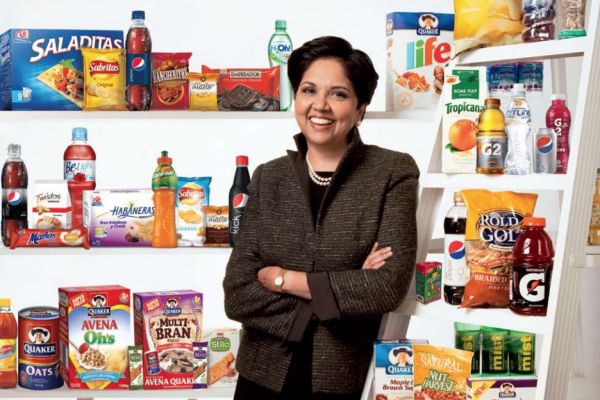For all the talk about improved gender representation in big business, the consumer goods industry is once again returning to familiar territory, with male CEOs now leading almost all of the industry's biggest firms.
That list was added to earlier this week, when Indra Nooyi, the CEO of PepsiCo, announced that she would be stepping down in October, to be replaced by Ramón Laguarta, the company's president.
Nooyi, who has led Pepsi since 2006 and spent a total of 24 years with the company, had positive words to say about her successor, describing him as "exactly the right person to build on our success", with a "proven track record of growing businesses".
Analysts, too, appear to have welcomed the move, with Bonnie Herzog of Wells Fargo saying that a change of leadership suggests that PepsiCo "may consider more strategic options", including "potentially splitting up the company" – something that is likely to whet the appetites of investors.
Behind all the talk of future strategy, however, the fact that Laguarta – experience notwithstanding – is a man is a step backwards in an industry that has made great strides in promoting gender diversity.
Ringing In The Changes
After all, this announcement follows just three months from the announcement that Denise Morrison, the respected head of the Campbell Soup Company, had retired, with Keith McLoughlin appointed interim CEO, and chief operating officer Luca Mignini, also a man, likely to take the hot seat once a restructuring process has been completed.
It also comes exactly a year after Irene Rosenfeld, the longstanding CEO of Mondeléz International and the individual who masterminded the snack firm's split from Kraft Foods, announced that she, too, would be stepping down.
She was replaced at the helm in March by Dirk Van de Put of McCain Foods, a very capable leader, but – you guessed it! – another man.
The departure of three high-profile female leaders in such quick succession puts pressure on companies to step up and address the issue of female representation at the top level.
There are still a smattering of female CEOs at top firms. Alison Cooper has led Imperial Brands, formerly Imperial Tobacco, since 2010, while Emma Walmsley succeeded Andrew Witty to take charge at GlaxoSmithKline in March 2017.
Sadly for the industry, the number of female CEOs appears to be dwindling, not increasing.
Women In The Workplace
The Women in the Workplace study, conducted by McKinsey and LeanIn.Org in 2017, sought to determine why female leaders are under-represented at the top level in business.
It found that many firms have 'blind spots' when it comes to diversity, and therefore cannot solve problems that they cannot understand clearly. For example, any employees think that women are well represented in leadership when they see only a few female leaders.
Drawing on data from 222 companies that employ more than 12 million people, it found that just 18% of C-suite employees at firms are white women, while just 3% are women of colour. The corresponding figures for males are 67% white males and 12% males of colour.
The McKinsey study also found that women tend to experience a workplace that is 'skewed in favour of men', from the ground up.
'Perhaps unsurprisingly, women are less optimistic about their prospects,' the study found. 'They are less likely than men to aspire to be a top executive. And even the women who aspire to be a top executive are significantly less likely to think they’ll become one than men with the same aspiration.'
The study called on firms to develop a 'comprehensive plan for supporting and advancing women', and to 'make a compelling case' for gender diversity.
In an era when FMCG businesses crave positive publicity on areas such as sustainability, added-value services and product reformulation, isn't it time that they addressed one of society's biggest irregularities?
© 2018 European Supermarket Magazine – your source for the latest retail news. Article by Stephen Wynne-Jones. Click subscribe to sign up to ESM: European Supermarket Magazine.















